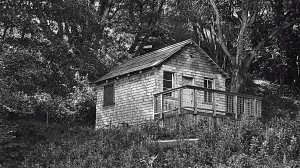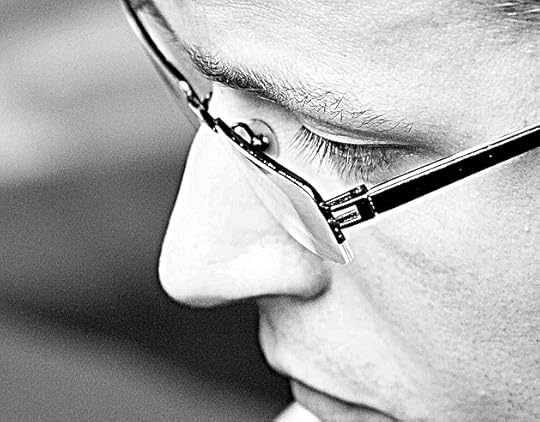The Danger in Nature

CROSS RIVER – It’s difficult to think of something that is more in harmony with American values than nature.
It’s difficult to think of an idea that is more rooted in our sense of individualism and more suited to our need for community than being natural.
When people are grounded and virtuous we say they have good nature. When something is balanced and self-sustaining, we call it a natural process. When something is beautiful beyond imagination we call it a natural wonder.
Nature is both the default we try to revert to and the upgrade we try to convert to.
In fact, our popular conscience in America is so informed by the high ideals of nature that we rarely think of the crude and cruel qualities of the wild world around us.
If we speak ill of nature at all it is to blame our failings on inherent weakness, which we call human nature, even if we do it more to exonerate our nature than to fault it.
After all, we’re only human.
But it’s dangerous to put too much stock in the nature within us, and not put enough faith in the higher state that awaits us.
The danger is that we are not nature.
Nature needs no revival. Nature needs no revolution. Nature needs no renaissance.
We do.
Unlike the beauty and the order of the natural world that needs no reform to thrive, if we fail to transcend our human nature we don’t survive.
II. Beyond Instinct
It’s not just our time that is obsessed with the idea of nature, of course.
In every generation, nature has been the inspiration of exploration, the muse of art, and the manifestation of divinity.
In one of the great spiritual classics of all time, St. Francis de Sales in his “Introduction to the Devout Life,” makes frequent use of the natural world to open new views into virtue.
“Taken alone, hemlock is not a quick but rather a slow poison and can easily be cured, but when taken with wine there is no antidote for it. So also slander that might by itself pass lightly in one ear and out the other, as we say, sticks in the hearers’ mind when expressed in some subtle, funny story.”
And in one of the great American literary classics, Thoreau retreats to the woods to live for two years near Walden Pond outside Concord, Mass., creating a masterwork of ecology, philosophy and theology.
“I was suddenly sensible of such sweet and beneficent society in nature…an infinite and unaccountable friendliness all at once like an atmosphere sustaining me.” Thoreau goes on to call nature “too pure to have market value, more beautiful than our lives, more transparent than our characters.” Thoreau sees in the morning of a spring day “no stronger proof of immortality.”
Just as it was generations before us, nature is our medicine cabinet. Nature is our grocery store. Nature is our playground. Nature is our laboratory. Nature is our art gallery. Nature is our church.
Nature is our life.
And yet we are greater than our nature.
St. Francis knew that. Thoreau knew that.
We need to remember that too.
The trees and the sea and the stones and the bees are fixed agents, because nothing in nature has free will.
Therefore, the lilies need no clothes, the sparrows need no wages, and the seasons need no treaties.
Nor does nature need solidarity. Or virtue. Or forgiveness.
But we do.
Nature may be ours by default, but character is only ours by choice.
And if we do not use our free will to overcome our nature, we succumb to it.
III. The Fall of Us All
The happy platitude that we get a little better each day is a wonderful encouragement in a world of uphill struggle that we probably draw from a faulty reading of nature that life in the wild is always evolving to a better state.
It isn’t true.
Charles Darwin, the author of “The Origin of the Species” and the architect of the theory that variation is preserved through natural selection, wrote to a colleague in 1856 “What a book a devil’s chaplain might write on the clumsy, wasteful, blundering, low and horribly cruel works of nature!”
But even if we accept the popular picture of the ever-improving process in nature, and even if we acknowledge the truth in adages such as ‘what doesn’t kill you makes you stronger,’ we all know that it is impossible to maintain anything like an ever-advancing record of perpetual forward progress.
In fact, there is evidence in each of our lives to make the case that we get a little shittier each day, and that the only thing keeping us from a more rapid pace of devolution is our virtuous efforts to resist it.
This reverse inertia is obvious in our physical lives once our grown bodies start to age. We can also observe this difficulty making progress in our mental health, even with the benefit of experience. Even with the aid of treatment.
But nowhere do we see this entropy clearer than when it comes to our moral lives. The way we treat other people simply does not get a little better day by day. We may make wonderful gains only to be set back by anger, pride and envy.
We may succeed in treating others the way we want to be treated until we are hurt or until we are abused or until we are betrayed, so that we can’t help but withdraw or lash out.
Or we may decide to avoid future conflict by protecting our exposure and by setting ourselves on a determined path to do no harm, only to find ourselves doing no good either.
Then there are all those times that we get in our own way, either because of character defects or because of character defenses.
It all comes to this: the moral life that we expect of ourselves may be possible to live today, but it is impossible to live every day.
And yet we must try to do it anyway if we are going to be happy.
So we look to nature’s blind and primal ways for inspiration and imitation.
But we see no morality in nature.
There is no right or wrong in rain.
There is nothing to show us the way to overcome ourselves in the wild.
So we must take un-natural chances and make artificial advances.
IV. Evolution, Devolution, Revolution
It’s all the rage to say “that’s just not natural.”
If something scandalizes us Americans, we call it unnatural. Never mind that this ‘unnatural’ act could be offending us because it challenges our own values, or it could be offending us because it upstages our own virtue.
What we are really doing is building up our nature by tearing down our spirit.
To us, being natural means having common sense. To us, common sense is the most genuine kind of sense and the most authentic kind of sense and the most organic kind of sense.
We Americans praise common sense so highly because we are so used to celebrating the wonderful things of life that come to us through sight and touch and taste and sound.
But the truth is that common sense is common. Common sense is what comes to us through the senses. Common sense excludes everything beyond the limits of sensory perception.
Common sense is as low as nature can go.
So when we condemn something that confounds by calling it unnatural, we are saying that it cannot be reconciled with the crude and primal instruments of understanding.
Calling something unnatural is the most ironic kind of condemnation, because with the same tongue that we are protesting error, we are confessing truth we don’t perceive.
Man is not evolution. A man who trusts in evolution devolves. Man is revolution. Man is constantly in need of reform because man is constantly exercising his free will imperfectly.
The mistake is not seeing ourselves in nature. The mistake is believing ourselves to be nature.
We can get to the higher state of the spirit where our souls know we must go if we are willing to let go of our nature.
Published on April 06, 2013 12:45
No comments have been added yet.
excerpts from The Wall at newquoin.com
Revival | Revolution | Renaissance
Whether it’s for the criticism, the confessions or the connections about reading, writing and the life of meaning, The Wall is where we discover what we know about ou Revival | Revolution | Renaissance
Whether it’s for the criticism, the confessions or the connections about reading, writing and the life of meaning, The Wall is where we discover what we know about ourselves and what we know about our world by exploring the questions of origin and destiny and identity and purpose.
The Wall is a place for transformation as much as a place for information. It is also a place for your contribution. ...more
Whether it’s for the criticism, the confessions or the connections about reading, writing and the life of meaning, The Wall is where we discover what we know about ou Revival | Revolution | Renaissance
Whether it’s for the criticism, the confessions or the connections about reading, writing and the life of meaning, The Wall is where we discover what we know about ourselves and what we know about our world by exploring the questions of origin and destiny and identity and purpose.
The Wall is a place for transformation as much as a place for information. It is also a place for your contribution. ...more
- Rob Ryser's profile
- 1 follower





















